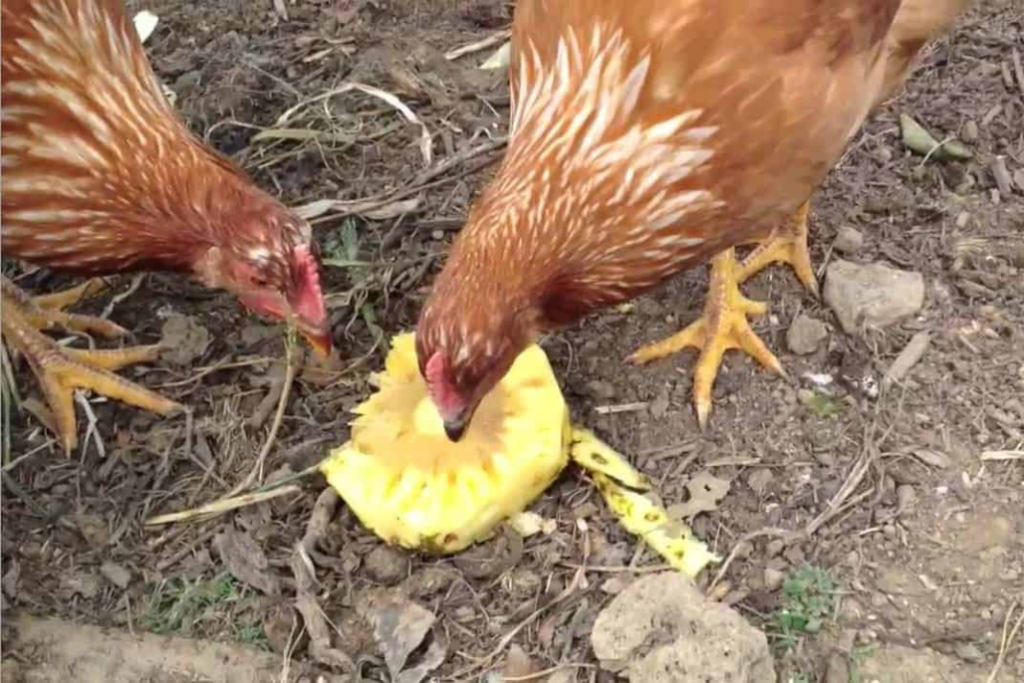Can Chickens Eat Pineapple? [REVEALED]
Tropical Tweets: Pineapple Possibilities in the Chicken Run

Sally loved pampering her backyard chickens with treats. One day she offered them a few chunks of ripe pineapple. The chickens gobbled them up eagerly! But Sally wondered – can chickens eat pineapple?
The short answer is yes. Chickens can eat pineapple in moderation. Pineapples contain nutrients like vitamin C and manganese that benefit chicken health.
However, too much pineapple can cause digestive issues due to its high sugar and acid content.
Pineapple for Chickens: A Keeper’s Insight into Benefits and Precautions
To learn more, I interviewed Jude, a chicken keeper for over 5 years whose flock loves pineapple. “I give my chickens a few small pieces of pineapple 2-3 times a week,” he explains.
“They go crazy for it! I haven’t had any issues as long as I follow the proper precautions.”

Pineapple is packed with beneficial vitamins, minerals, and antioxidants. It provides chickens with the following:
- Vitamin C – supports immunity and combats stress
- Manganese – promotes bone health
- Bromelain – aids digestion
- Natural sugar – energizes chickens
- Antioxidants – boost immune function
However, too much pineapple can cause problems like:
- Weight gain from excess sugar
- Digestive irritation from acidity
- Diarrhea or loose droppings
Moderation is Key
That’s right! The key is moderation. The American Veterinary Medical Association recommends feeding chickens 1-2 small chunks of pineapple 2-3 times per week at most.
Always monitor your chickens’ weight and droppings after feeding high-sugar fruits.
It’s also crucial to remove the skin, rind, and tough cores before serving pineapple to chickens, as these fibrous parts can obstruct digestion.
Read More: Can Chickens Eat Apples?
Can Chickens Eat Pineapple Rind and Skins?
No, chickens should not eat the rind or outer skin of the pineapple. The skin is very rough and fibrous, making it difficult for chickens to digest.
The rind and skin should always be removed before feeding pineapple to chickens.
Can Chickens Eat Pineapple Leaves?
Pineapple leaves contain oxalic acid, which can be toxic to chickens in high amounts. It’s best to avoid feeding them any part of the pineapple plant besides the main fruit.
Can Chickens Eat Pineapple Stems?
The pineapple’s base and stems, like the leaves, are high in oxalic acid and should not be fed to chickens. Stick to the fleshy fruit only!
Can Baby Chickens (Chicks) Eat Pineapple?
Pineapple should be avoided until chicks are at least 4 weeks old. Their digestive systems are too immature to handle the high sugar and acidity. Once over 4 weeks old, small, infrequent portions are okay.
We’ve covered feeding pineapple to adult chickens and chicks. Now let’s explore some other ways pineapple can benefit chicken health and well-being.
Can Pineapple Help Impacted Crop in Chickens?
Yes, the bromelain enzyme naturally found in pineapple can help break down compacted food in cases of impacted crops.
Just mix a few chunks of fresh pineapple with water and administer orally using a crop needle. The bromelain will help loosen and clear the blockage.
Besides impacted crop, pineapple may offer other health benefits:
- May reduce risk of cardiovascular disease
- Could improve immune function
- Promotes bone strength from manganese
- May stimulate egg production
Pineapple is not a necessary staple but can be a nutritious supplement alongside a balanced diet. When feeding, be sure to monitor for any signs of diarrhea or indigestion. Moderation is key!
We’ve just about covered it all when it comes to feeding chickens pineapple. To recap, small, infrequent portions of fresh pineapple can be a tasty, healthy treat.
Just be sure to take the proper precautions. Thanks for reading!



